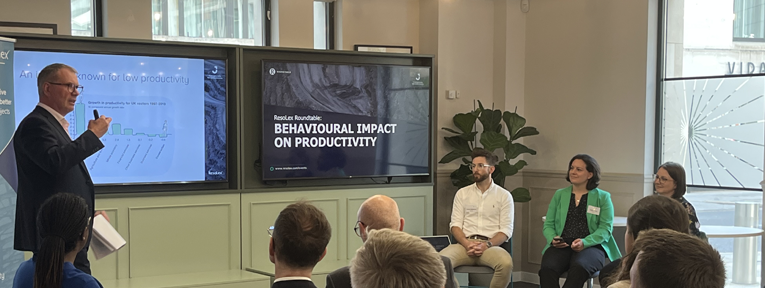
Jul 12, 2023 | Events, Roundtables
Last week, we were delighted to welcome three guest speakers from Jacobs to the ResoLex Roundtable: Jessica Ellery, Gail Hunter, and Joshua Weatherley. Jacobs is a full-spectrum professional services firm including consulting, technical, scientific and project delivery with a workforce of about 60,000 people worldwide.
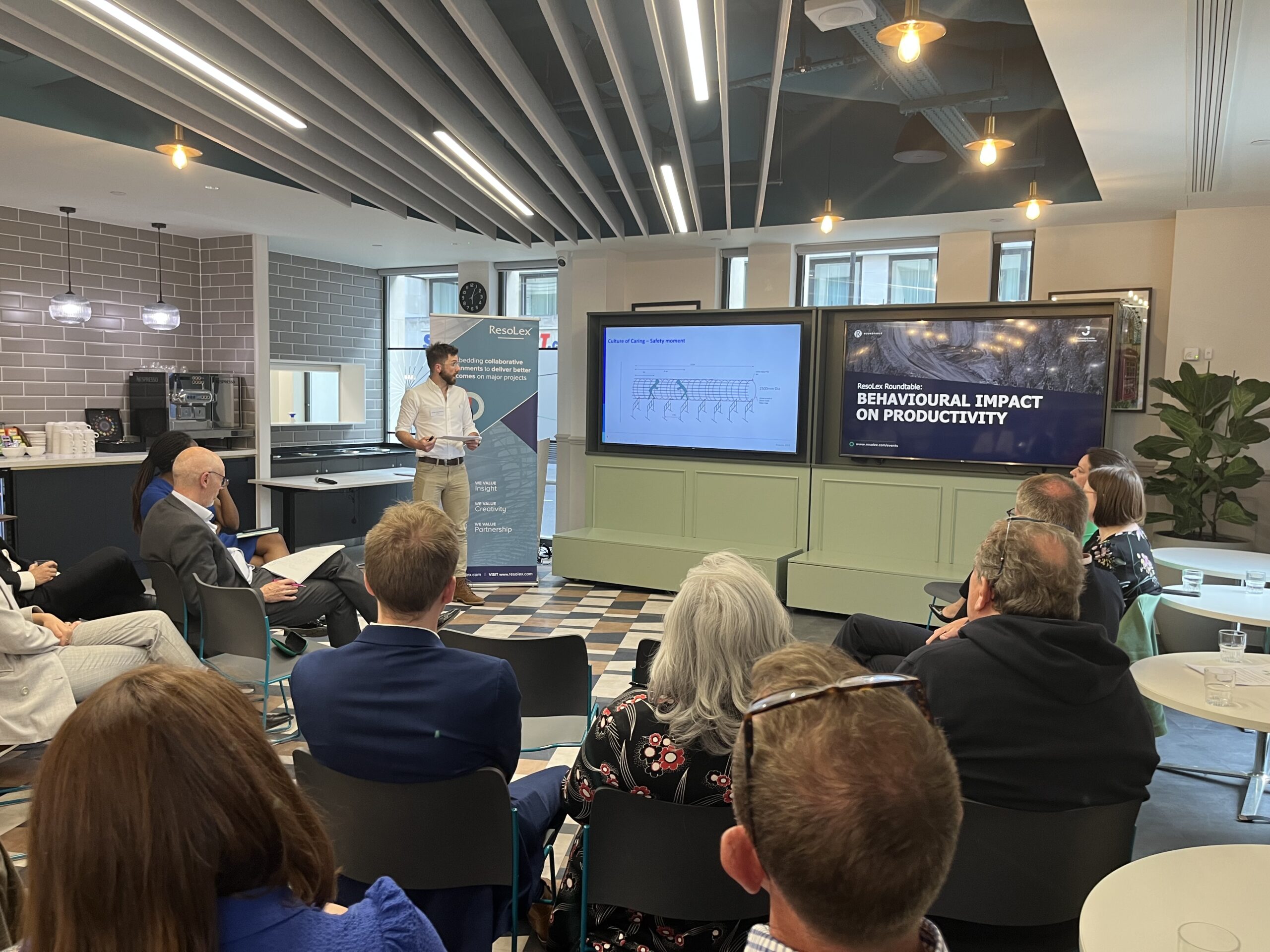
The evening was introduced by our Associate Director, Kelachi Amadi-Echendu, who provided some background to the ResoLex Roundtables and how the event links with our values as a business. Our Chief Executive, Edward Moore then introduced the topic, reminding us that whilst collaboration in itself may be very nice, if it doesn’t improve productivity, one has to question the point! At ResoLex, we see projects as comprising three primary areas of expertise: technical, commercial, and social. We believe that the key elements are interlinked, and the social component is inextricably linked to project performance. During the session, Ed highlighted our model, and expanded on the need to take an integrated approach to the three elements in order to achieve project success.
Jess, Josh and Gail explored the topic through the lens of a live giga project that is in its early stages of delivery in Saudi Arabia. A perspective offered was that perhaps the scale and longevity of such programs offered the chance to truly embed an effective, collaborative social system, even more so than the opportunity we have in the mega-project environment. The presentation began with a poignant safety moment, and then an introduction to four immense projects in the Neom region of Saudi Arabia. Each of these projects are hugely ambitious, the most dramatic being The Line. The Line is a revolution for urban living, which according to the plans will be 500m tall, 200 meters wide and a staggering 170km in length. Whilst a project of this scale is fascinating in itself, the evening’s platform served as the backdrop to a much broader discussion around the challenges of working in such a complex programme environment. Throughout the session, Josh and Gail prompted the audience with a range of engaging questions and themes designed to stimulate debate (a dangerous thing to do with a ResoLex audience!).
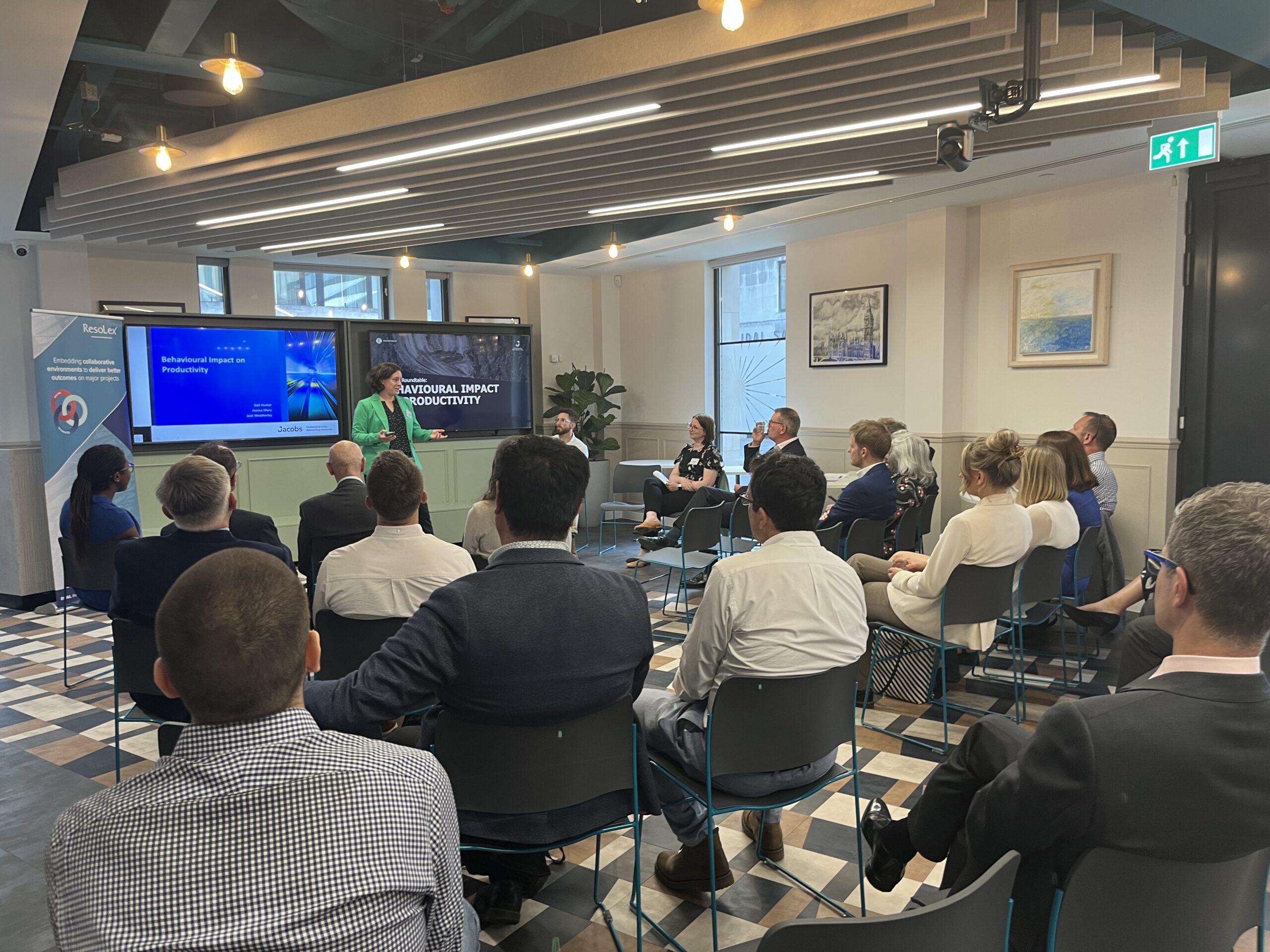
The presentation identified the challenges created by the multiple interfaces that must be managed by the teams and explained that this becomes exponentially more difficult to cope with as size and scale increase, supporting the initial introduction and highlighting the need to therefore factor in behaviours when setting the project strategy. This stimulated a lengthy discussion in the room around the more nebulous concepts of leadership and project culture, there was a common agreement that paying attention to these areas early in the programme is a critical success factor. It was also noted that one of the reasons for the poor performance of mega projects, in general, is the lack of ability for many project leaders to scale up from large projects, and when faced with high levels of complexity, they tend to fall back on simplistic solutions which inevitably fail in more complex and challenging environments.
So, what are the conclusions from the evening’s discussion? Here are our top five takeaways:
- There is a need to ‘operationalise’ collaborative intent. In other words, major projects (and especially giga projects) need to focus on establishing the policies and processes that will embed the principles of collaborative ways of working throughout the programme, rather than limiting the discussion to senior management.
- Focus on the active steps needed to build a positive culture, avoiding the default tendency to revert to transactional behaviours as soon as the project comes under pressure.
- The risk management process needs to acknowledge behavioural risk and recognise that effective inter-team relationships are both a risk and an opportunity.
- Relationship management plans should be a compulsory part of the early planning process and should focus on identifying the critical interfaces that need to be mapped and managed.
- Project leaders need to be trained specifically in the practical tools and techniques that will enable them to make the right decisions when working in highly ambiguous and complex environments.
The session closed with reference to the work of Edgar Schein, and his observation that for successful teams, people need to build ‘Level 2 relationships’ with their colleagues. This level of relationship is where we know enough about the people we work with on a regular basis to be able to see them as human beings, rather than just human ‘resources’, who carry out a functional role.
Overall, it was another stimulating and educational evening, with a wide range of views and opinions. As we see projects and programmes becoming ever more ambitious in their scale and desired outcome, the session is a reminder (should we need it!) that planning, setting up and mobilising for success from the start makes life considerably easier for the teams trying to deliver downstream.
If you’d like to join our next Roundtable, please keep an eye on our events page or sign up for our LinkedIn events newsletter.
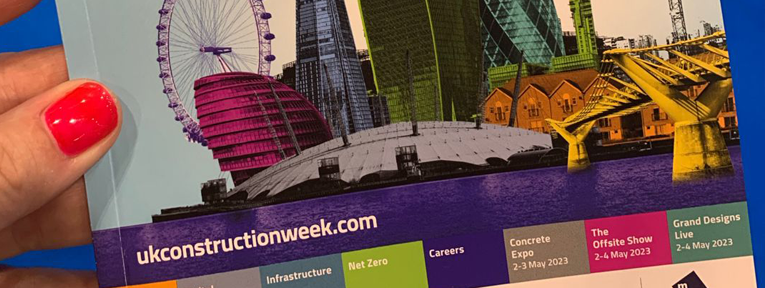
May 3, 2023 | Events
Yesterday, we visited ExCeL London for the first day of UK Construction Week 2023. The theme this year focused on the importance of ‘culture change’ within the industry and was celebrated with a Culture Change Hub, a new addition to the Construction Week programme. Sessions at the Culture Change Hub were delivered by a diverse range of speakers and panellists, covering topics including equality, diversity and inclusion, mental health and attracting new entrants to the industry.
It was great to see so many people coming together to challenge the status quo, articulate the cultural barriers within the industry and highlight the need for change. Below are some of our key takeaways from the day.
Culture change: What does it mean for the construction industry?
Panellists:
- George Clarke, Architect, television presenter, lecturer and writer – Channel 4, MOBIE (Facilitator)
- Mike Pitts, Deputy Challenge Director – Transforming Construction – Innovate UK
- Nikita Mikhailov, Personality Psychologist – PsyPub
- Amit Oberoi, Executive Chairman – Considerate Constructors Scheme
- Bijal Mehta, Associate – Marchini Curran Associates
The panel members as part of this seminar identified that we are experiencing an important shift in language. We are moving away from a focus purely on construction, towards the ‘built environment’ as a descriptor for the activities that organisations across the industry are involved in and contribute to. This is a more inclusive way to describe the industry, both allowing room to include designers, clients, and those with boots on the ground delivering the projects and encompassing the societal and environmental impacts of all aspects of what we do as an industry.
The discussion moved to the realm of mega projects, with reflections that they often draw negative attention in the media, reporting is often focused on problems, delays and over-expenditure, with limited mention of the positive impacts, particularly for local communities. The panellists all agreed on the power of stories and narrative, and endorsed a need for positive stories to be spread about the positive transformation that these major programmes deliver.
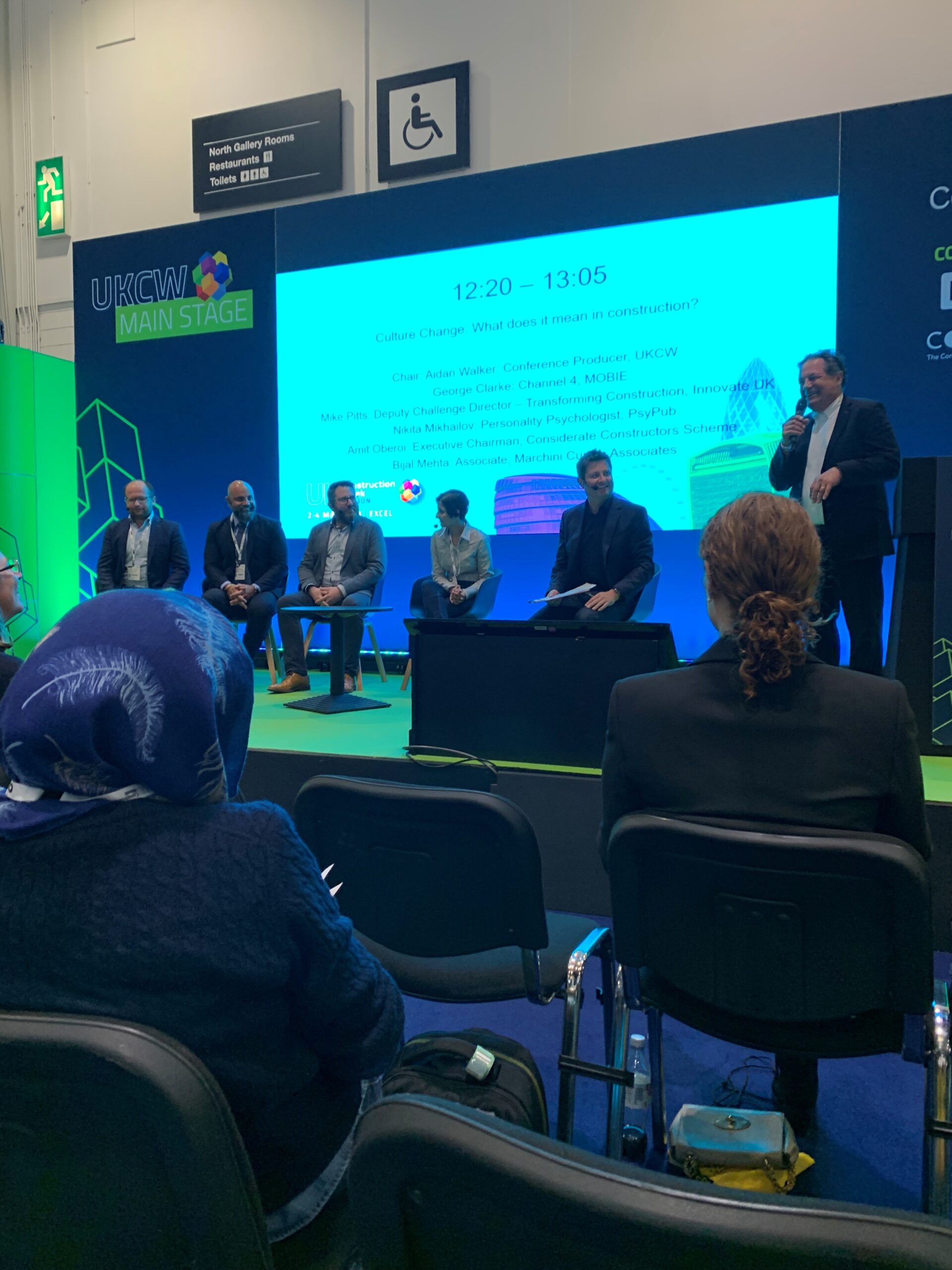
There was a consensus that there is still a need for a huge change in culture and more importantly mindset. The culture of the industry needs to be more inclusive and better at embracing diverse thinking. Discussions on confirmation bias and tribal tendencies reminded us that, as individuals, we like to stick with groups of people who support our thinking and may therefore struggle to harness the benefit of our differences. Actively listening to those who may challenge our thinking will encourage differing perspectives, allowing us to have a better understanding and hopefully, avoid biased thinking.
Cultural change: how?
While it is great to see many people highlighting the importance of cultural change, we need to look at how and more importantly, why?
There is a growing awareness of the impact that culture has on the success of any large group of people trying to work together. The limited research that has been done tends to focus on culture change in existing businesses and institutions but seldom project delivery teams.
Not only will this encourage diverse thinking but a positive and healthy culture will drive increased performance and staff retention.
There is no simple blueprint for how to approach culture on a project but we did start to address the topic in an article that looks at the culture within the project environment and explores how you can build and sustain the desired culture in the project environment: https://resolex.com/news-insight/culture-in-the-project-environment/

Mar 28, 2023 | Tools
Projects often start with positive intentions, especially if you hold a good kick-off workshop which generates lots of ideas and action plans, and the team leave the event feeling energised and hopeful. Pretty soon, however, the reality of delivery kicks in and all the plans that would have embedded collaborative ways of working drift to the periphery of the agenda. So how do you keep the momentum going after the initial workshop is over? The best mechanism we have found is to establish a collaboration workstream.
A workstream is essentially a cluster of tasks that need to be completed to achieve a particular outcome within the project. The point of the collaboration workstream is to follow up on the actions and initiatives that the leadership team know are important, but are often otherwise displaced by the urgent issues that typically dominate their agenda. To give an example, the following list of questions emerged from the output of a recent project kick-off workshop:
- How do we establish a culture of ‘collaborative delivery’ throughout the project so that everyone understands the positive behaviours?
- What are the teams’ non-financial objectives and what are activities that will support their achievement?
- What actions are needed to develop a well-considered Relationship Management Plan?
- How does the project leadership monitor and measure the relationships between the key parties involved?
- How do we establish a communication strategy that emphasises the underlying narratives that will support a collaborative culture?
- What is the collaborative maturity of the teams and what training is needed to improve their collaborative skills?
- Where are the potential areas of disagreement/dispute that potentially lie ahead and how do we prepare the teams to avoid or resolve them?
- How do we define collaborative ways of working and how do we communicate them to everyone working on the project?
Each of these questions is a component of the overall delivery strategy that will require different levels of attention throughout the project lifecycle. As you can see, there is a lot to do, and so the tasks that arise from the discussion need to be resourced, organised and managed. It, therefore, makes sense to form a ‘Collaboration Workstream Steering Group’ that meets at regular intervals to oversee the progress. We recommend that the membership of the group should be no more than 5 to 6 people. Within this group, there must be a senior project manager or leader and ideally a collaborative specialist. The remainder of the group should be selected from individuals senior enough to ensure decisions are acted upon.
The other critical success factor is to identify and set up metrics that are reported to the project leadership team regularly. Collaborative metrics might include:
- Culture of trust and openness
- Clarity of delivery strategy
- Alignment of teams to the common goal
- Effective communication
- Effective meetings
- Information sharing
- One team ethos
Throughout the programme, one would expect to see these metrics move positively and negatively depending upon periods of pressure. We have found that reporting the trends regularly keeps the people element of the programme higher up on the leadership team agenda, prompting actions that can then be managed by the ’Collaboration Steering Group.
Collaborative delivery is as much a philosophy as it is a series of activities, but to be effective it must sit at the heart of a project or programme. By establishing a collaboration workstream, the management team is creating the facility to ensure the behaviours needed to achieve success are embedded into the team’s culture.
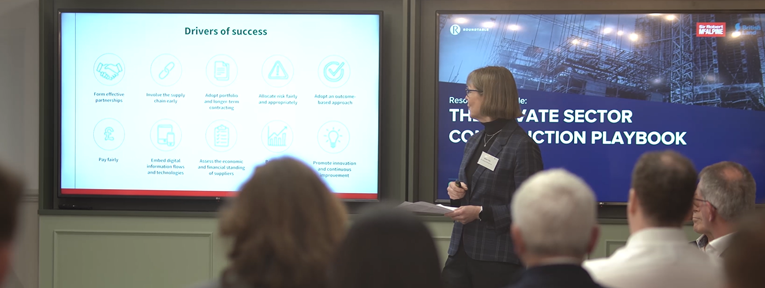
Mar 10, 2023 | Events, Roundtables
The discussion yesterday evening focused on the Private Sector Construction Playbook, a best practice guide published in November 2022. We were joined by two guest speakers, Alison Cox, Managing Director of Sir Robert McAlpine London Charles Horne, Project Director of British Land and, ResoLex Chief Executive Edward Moore.
Our Principal Consultant, Kelachi Amadi-Echendu began the session, by describing the journey from the government’s Construction Playbook to today’s Private Sector Playbook. She explained how the themes from the ResoLex publication ‘Changing Behaviours in Construction: A Complement to the Construction Playbook’, apply not only in the public sector but also to private sector projects and programmes, to enable improved delivery and better outcomes.
“Historically, the UK construction industry has been characterised by a lack of openness, poor productivity and a failure to invest in innovation”.
Foreword, Trust and Productivity The Private Sector Construction Playbook, November 2022
With many years of experience in the sector, driving excellence and delivering complex and challenging solutions for clients, we were delighted to have Alison Cox join us. Alison began explaining that the Private Sector Playbook was created by the construction productivity taskforce, a working group of developers, contractors, suppliers and professional service providers from the private sector whose underlying purpose is to try and improve productivity in the construction industry. She noted that whilst productivity had improved in a number of sectors, construction productivity had actually declined by 0.6% in the last 20 years. The document was designed to complement the Public Sector Construction Playbook that was released in 2020, taking cues from the public sector whilst understanding the challenges faced by the private sector.
The Playbook is structured around ten key drivers for success, as illustrated in the diagram below. It is interesting to note that half of these focus on culture and behaviours. Alison emphasised the need to concentrate on building the right relationships, particularly at the beginning of a project. She mentioned her own experiences on the construction of the Bloomberg offices where key members of the different teams sat in close proximity in a co-located office. This was a project that was quite dynamic and required the team to be highly adaptable to changes in requirements. The strength of relationships established in the early phases of the project enabled the teams involved to focus on ‘best for project’ decisions, rather than solutions which might be best for individual organisations.
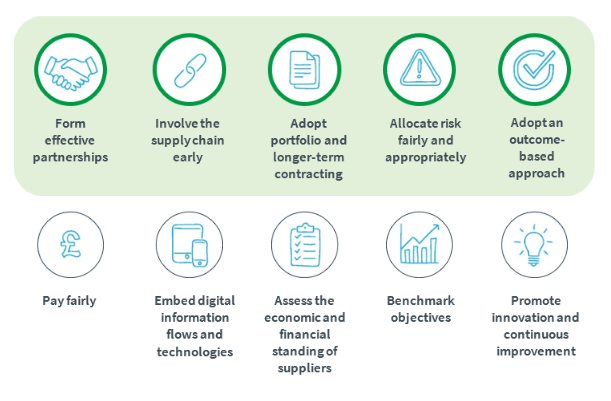
Charles observed the many changes in the construction industry since his experiences working on sites in the mid-1980s, as illustrated by the massive shift in safety that now exists compared to forty years ago. He highlighted the cultural change around health, safety and wellbeing, which simply did not feature when he first began his career. His primary observation is that projects are delivered by people rather than by technology or process. His recent experiences are drawn from Broadgate, where British Land is developing seven consecutive significant buildings under the Broadgate Framework. His starting point for creating the development strategy was the recognition that the customers for these properties are the local users in the area, and as such, care needs to be taken to avoid creating major disruption as the construction works to proceed. Charles’ approach required working with partners rather than suppliers, and so, in a significant break from traditional procurement practices, British Land has entered into a 10-year framework agreement with Sir Robert McAlpine. The framework enables British Land to reduce the risk of multiple concurrent projects and promotes consistency, continuity and innovation.
Contractual mechanisms aside, Charles, focused from the start on establishing an underlying ethos for the programme, based on the principles of Trust, Honesty and Collaboration. These principles have been developed into a set of rules, which every individual involved in the projects are expected to follow. The rules are generally self-policed, and there are very few instances where they are not applied by the numerous teams engaged in the programme. Charles identified a critical role that leadership plays in establishing a successful culture, recognising that in a collaborative contract, leaders need to be skilled at building ‘followership’.
He recognised the challenges of complexity and used the analogy of a pebble dropping into a pond and creating small waves. As projects grow in size and scale, leaders must deal with the challenge of lots of pebbles, dropping into the pool at the same time each creating ripples which intersect and disrupt with each other. He agreed with Alison that co-location is a critical factor in building cohesive and collaborative teams and is fundamental to building teamwork and understanding.
Ed Moore identified the need to establish the right culture from the start, quoting Abraham Lincoln, who said ‘give me six hours to chop down a tree and I would spend the first four sharpening the axe’. Ed made the case that programmes should treat relationship development as a distinct and separate workstream with its own targets and deliverables. Ed observed that too many project leaders tend to assume that their teams will naturally form into collaborative teams and therefore ignore the opportunity to shape the behaviours which occur at the very start. Ed also highlighted the need for project and programme teams to introduce a framework to help teams structure their workstream, and gave an example of the ASARI framework created by ResoLex as illustrated below:
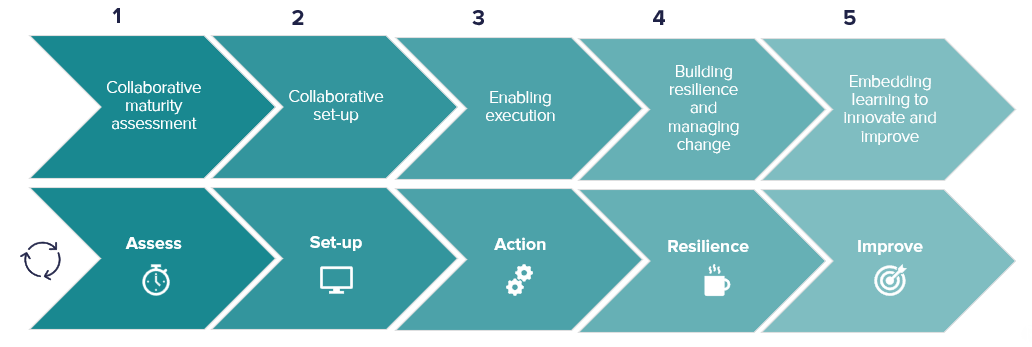
Some of the key points of the discussion from the floor, were as follows:
- Project culture is directly linked to the quality of leadership.
- A critical skill for project leaders is to learn to listen to other points of view rather than press on with their sole perspective as to how a problem should be solved.
- The time for the individual heroic project director has passed. The role of the project director is now to build leadership throughout the team.
- The primary barrier to industry-wide adoption of the Private Sector Playbook remains a driver amongst many clients to appoint the lowest tender, thus propagating the bad habits, behaviours and relationships that inevitably emerge from such practices.
- The key to wider adoption must be to focus on being able to clearly articulate the difference between value over cost and use the successes of previous projects to persuade others to continue to support a route based on effective relationships.
As a final comment, Charles pointed out that on Broadgate, each of the individual projects is still negotiated within the framework. He nevertheless observed that not one contractual letter has yet been issued by either party throughout the delivery of the programme. As he put it, when a difficult issue arises it is ‘our’ problem, not just ‘your’ problem. This is a great illustration of collaboration working in practice.
You can find the featured publications linked below:
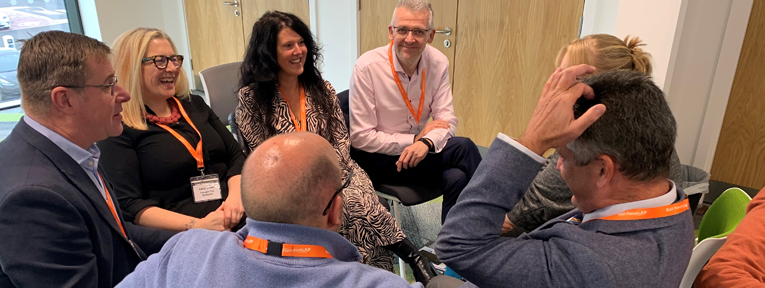
Nov 8, 2022 | Events
Rail Forum event – Infrastructure Collaboration: A Route to Success
Last week, we had the opportunity to join the Rail Forum as an event partner and keynote speaker for their Infrastructure Collaboration: A Route to Success event. Around 80 delegates gathered together at the RaisE Business Centre in Goole to hear from industry experts to unpick collaboration, what it means for the supply chain and how it can work well in practice. Ben Higgens, Engagement Manager at the Rail Forum opened the floor explaining that in order for collaboration to work, it needs to be a win-win for all parties.
“Given how important collaboration is and will continue to be moving forward in the industry, we are keen that it does not become another buzzword. By providing an opportunity for our members to hear best practice case studies, key considerations for when looking to collaborate, and also a legal perspective, they are better placed to collaborate effectively”. – Ben Higgens, Engagement Manager at Rail Forum
Keynote: Creating a collaborative project environment to drive performance
ResoLex has been working for the last 20 years to embed collaborative environments in large infrastructure projects to achieve better project outcomes. We were therefore delighted to share our industry experience as the keynote speaker at the event. Our Chief Executive, Edward Moore started the session with a bang… well technically with a question! “Collaboration is the answer but what is the question?”
He pointed out that with just the 80 attendees there were 6320 potential connections in the room. If one thinks of some of the major projects with thousands of people in the supply chain, there are millions of potential connections! The greater the number of connections, the greater complexity involved in managing that project through to successful completion. Ed went on to look at the difference between transactional, cooperative and collaborative relationships and how to determine which approach is best for your project and whether collaboration is the right answer.
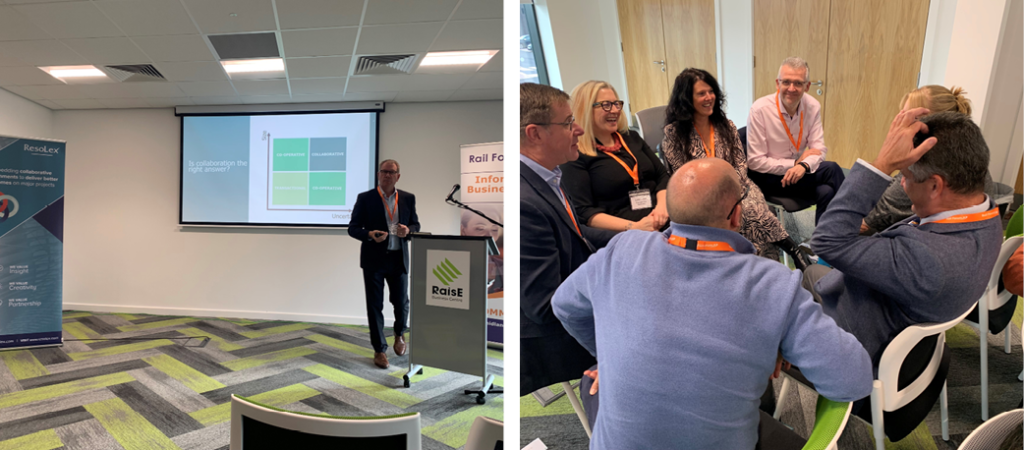
He then delved into what collaboration may bring including; enhanced benefits realisation, time-saving and an enhanced outcome, moving on to how one can create purposeful relationships and the attributes of a collaborative relationship.
“Let’s think about the most effective relationships we want and if the answer is collaborative then let’s not go in light-heartedly. Let’s do it with the right investment, and the right commitment and then what we can create is a connected ecosystem that allows the value to be drawn from all of the supply chain. The alignment, the sharing of knowledge between the client with their external drivers and their project objectives, right the way through so that everyone is part of an aligned supply chain that are all working to that one goal. Then I think we will start to see a real upshift in project performance and the value can be created.” – Edward Moore, CEO at ResoLex
Guest speaker summary
Speakers including Mark Smith from TAZIER, John Allsop from VAN ELLE, Jake Rudham from Unipart Rail and Graham Shaw from Volker Rail each explained the importance of collaborative relationships and environments on their projects. The key takeaways included the alignment of objectives within the partnership and understanding the scope of responsibilities. Drawing on the importance of business relationships, developing personal relationships with like-minded individuals within the businesses was also mentioned.
Mike Halliday, Network Rail Eastern expressed the need for behavioural change to understand the supply chain a little better. He also highlighted the importance of identifying risks early within a project and taking an approach that puts the project first. Many project leaders and professionals understand the need to identify risks but often miss or put less effort into identifying behavioural risks. ResoLex has developed a number of tools to use in complex environments to help identify these risks, you can find out more on our website here.
Emma Toes, Nelsons solicitors mentioned the considerations you should have and the legal boundaries in place for a successful collaborative relationship. She highlighted the need for a contract to protect your business, project and relationship.
To finish the session, Ben posed the question: What is one word to describe collaboration? With answers from the guest speakers including:
• Trust
• Alignment
• Reliability
• Pride
We’d like to thank those at the Rail Forum for their continued support and the opportunity to be a partner and keynote speaker at such an insightful event. We hope the importance of collaborative environments rings true for many working on major projects and in complex environments. If you think we could be of assistance to support your team, please get in touch.










